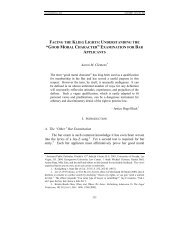The Science and Statistics Behind Spanking Suggests that
The Science and Statistics Behind Spanking Suggests that
The Science and Statistics Behind Spanking Suggests that
You also want an ePaper? Increase the reach of your titles
YUMPU automatically turns print PDFs into web optimized ePapers that Google loves.
11-FULLER_FINAL_AFTERPROOF.DOC 2/17/2009 8:50 AM<br />
2009] THE SCIENCE AND STATISTICS BEHIND SPANKING 305<br />
D. “Risk . . . Alone Is Insufficient to Support Regulation” 338 Because “It<br />
Is Always a Doubtful Course, to Argue Against the Use or<br />
Existence of a Power, from the Possibility of Its Abuse” 339<br />
When the research of spanking opponents is challenged, they often<br />
claim they are only trying to expose “risk.” 340 For example, Dr.<br />
Penelope Leach of London’s Royal Free Hospital admits <strong>that</strong> “no single<br />
variable such as physical punishment would be expected to account for<br />
all the variance in the outcomes of upbringing.” 341 Nevertheless, she<br />
insists <strong>that</strong> “[t]he relevant concept is risk, <strong>and</strong> explaining risk is part of<br />
government’s role.” 342<br />
That’s as logical as saying it’s the government’s job to explain the<br />
risk <strong>that</strong> cutting potatoes with knives may lead to stabbings. Statements<br />
like Dr. Leach’s are generally unsupported by the sound research<br />
because such research suggests <strong>that</strong> the risk of abuse lies in the parenting<br />
style, not the discipline method. 343 Just as most people h<strong>and</strong>le knives<br />
responsibly, most parents spank responsibly. 344<br />
338. FEC v. Beaumont, 539 U.S. 146, 159-60 n.5 (2003) (citing Austin v. Mich. Chamber of<br />
Commerce, 494 U.S. 652, 658-59 (1990).<br />
339. Martin v. Hunter’s Lessee, 14 U.S. 304, 344 (1816) (also saying, “From the very nature<br />
of things, the absolute right of decision, in the last resort, must rest somewhere—wherever it may be<br />
vested it is susceptible of abuse.”).<br />
340. See U.N., League Table, supra note 7, at 30 (“Penelope Leach, Senior Research Fellow at<br />
London’s Royal Free Hospital <strong>and</strong> University College Medical School <strong>and</strong> an anti-physical<br />
punishment campaigner has written: ‘Concepts such as statistical significance, correlation,<br />
prediction or risk are difficult to present comprehensibly in the brief <strong>and</strong> simple terms dem<strong>and</strong>ed by<br />
the media . . . . [T]he relevant concept is risk . . . .’”).<br />
341. Id. (Dr. Leach saying, “It is difficult to explain, briefly, <strong>that</strong> no single variable such as<br />
physical punishment would be expected to account for all the variance in the outcomes of<br />
upbringing; <strong>that</strong> nobody is suggesting <strong>that</strong> every smack leads to antisocial behaviour any more than<br />
every cigarette leads to lung cancer, or even <strong>that</strong> everybody who is beaten a great deal is certain to<br />
show later ill effects any more than everybody who smokes a great deal is certain to get lung<br />
disease.”).<br />
342. Id. (quoting Dr. Leach).<br />
343. See, e.g., supra note 301 <strong>and</strong> accompanying text.<br />
344. See, e.g., Rebecca R. S. Socolar, M.D & Ruth E. K. Stein, M.D. <strong>Spanking</strong> Infants <strong>and</strong><br />
Toddlers: Maternal Belief <strong>and</strong> Practice. 95 PEDIATRICS (1995) 105-111 (indicating “<strong>that</strong> most<br />
parents who spank do not spank on impulse, but purposefully spank their children with a belief in its<br />
effectiveness. Furthermore, the study revealed no significant correlation between the frequency of<br />
spanking <strong>and</strong> the anger reported by mothers. Actually, the mothers who reported being angry were<br />
not the same parents who spanked.”); supra note 210-212 <strong>and</strong> accompanying text.

















